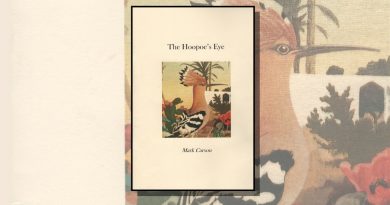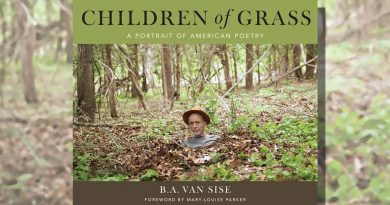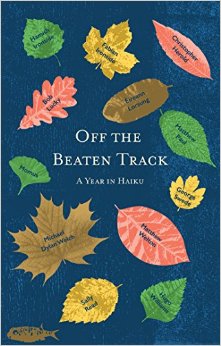Opting for Glaciers: Hove-to is a State of Mind by Mark Carson
– Reviewed by Simon Zonenblick –
Mark Carson hooked me on the opening page of this twelve poem collection, when he described ticks as “handsome.” ‘Cherangani’, the first poem of Hove-to is a State of Mind – deservedly commended in the 2011 Troubadour competition – recounts the poet’s early morning experiences among Kenya’s Cherangani hills, taking in depictions of a kingfisher, roasted coffee, crusty rolls and marmalade – even the sun rising in the Kerio Valley. But it was the ticks that got me: “The handsome black and yellow ticks which shouldered their way up the grass stems / to the very tip / shoving each other / for the most advantageous position,” to be precise. Having often written about – and at times been scorned for writing about – the beauties of insects and other unsung little creatures, how could I fail to be attracted to this unexpected and mindful description of an African arachnid? While I would not want to play down the damage that these diminutive blood-suckers can do – not least to other non-human animals – who could fail to be charmed by these grass-scaling Ambylomma?
I admit I had to do a bit of research before identifying the Latin genus of the tick, but diving into the dictionary or exploring Google was something I found myself doing on several occasions thanks to this unusual little book. Even the names of the poems were at times unknown to me. ‘Cherangani’, ‘Flycamping by the Mari River’, ‘Splicing Cordage’, ‘Per Ardua ad Nauseam’, my vocabulary has been substantially enlarged as a result of reading this collection. By the time I got to ‘My Tattoos’ and ‘Donegal’ I was not sure whether I should feel relieved or disappointed that I required no dictionary to understand their titles.
Mark Carson is adventurous in his wordplay within poems too. serving up portmanteaus and unexpected conjunctions aplenty:
Flysoup air thickens…
Disisisaster!
(Flycamping by the Mari River)
and the seat squab was pushy
in all the wrong regions(Mistaken)
Though he can at times be almost nihilistically straightforward, as in the title poem:
Mark time, this world goes nowhere.
It tilts, was there a time when it did not? Try to remember it
and fail. World
without end.The ocean heaps in ugly lumps
and rips itsself to shreds,
muscles its meaningless bulk
This is a sea, and world, of violence and almost banal brutality – a World without peace viewed from the eye of somebody who, after a career as an ocean engineer, has seen it from some of its most extreme angles. And yet I suspect somehow that the centre-piece of this collection, or the poem in which its themes are given fullest vent, is the nostalgic, anecdotal ‘Knucklebone’, four poems in – a recollection:
I once dined alongside a man with two fingers missing
who drank his share of the Chablis, the claret, the sweet dessert wine,
then deep draughts of port. There was a time, he said,
’twas a good time, the best of times …
He was not dining “with” the man – there is a distance between them which cannot as yet be bridged by any further familiarity than that of two people alongside but not with each other, and it is implied that this distance has at its heart the unique experiences of this partially de-fingered diner, the exotic and at times dangerous nature of which places him a world apart. This is because the man opted for glaciers, and this choice of work meant that he had
Spent the rest of his life in the world’s coldest places,
Antarctic Peninsula, lost fingers to frostbite, eyes burnt out from snow-glare.
The knucklebone choice, he said…
This is the collection’s pivotal poem, presenting us with a vision of the youthful, wide-eyed author – quietly intoxicated by a tale of adventure – embarking on his own “knucklebone choice.” Now it is we, the readers, who play the part of listener, as Carson expands:
And my knucklebone choice is this caucus
of deep-water scientists, grizzled oceanographers…I gave up a landlocked career for an ocean.
The blurb records that Carson’s poems are flavoured by his Irish roots, career on the ocean, and time spent in Africa, and this tapestry of international influence is highly evident in poems like ‘A Message from the Southern Ocean’:
We crouch on English shingle but
Off Cape Horn a storm so violent
speaks to us, a long low wave
sweeps north past capes and islands,rock-strewn Falklands,
Tristan da Cunha, Saint Helena
Lanzarote, the Azores.
It is evident in the atmospheric ‘Sea-ghosts’, with “wetsuit grazing coral and the reef’s cornice”, in ‘Mistaken’, down its “common as muck” sidestreets of Dublin, and the gorgeous pairing of the two last poems – ‘In County Clare’ and ‘Donegal’. In the former, whose beginning reads like a continuation or, well, a post-script to Seamus Heaney’s poem ‘Postscript’, a somehow mythic love dangles in the “drama of the sinking sun as the figure of the girl will appear” in the east, a farewell song which seems to echo with the pains of exodus and exile, as the poet wishes for “a curragh and a crew of hard-armed lads / and a wet brown cow with a bucket of kelp and bladderwrack.” The whole of Irish history is hinted at, but only hinted at – as the trails of geese are stretched to the furthermost island, past grievances and pains might be laid to rest, but not forgotten. It is an honest poem, as its author confides that “murmuring speech / leaks secrets that I don’t wish to know across inlets.” How refeshingly human, that this acutely painful poem has at its hub that most “Universal need to sometimes turn away, or not to know, to not want to be burdened with what knowing might bring.” The poet’s acknowledgment of this is effective, as an unflinching mirror of barbaric truths, and also for its strangely soothing vulnerability.
Carson does something else that I have never come across. We need now to revert to the opening poem, Cherangani – that of the crusty rolls and handsome ticks. The crux of the poem is not so much the poet’s uncanny observations (strange hybrid cornflakes) as a cross-cultural exchange between he and his family, and an approaching African woman and her children:
and now they were really quite close
shy but forward and we could see
the dull gleam of her neckrings
and the colour gash of her beads
and her little ones giggled
at the fair voluminous curls of our little ones.
But just as we think we are about to stumble upon a fairly normal and predictable re-hashing of a cliche – worldly but spiritually poor Westerners contrasted with tribespeople obviously impoverished but exuding purity and wisdom – a chance interaction offers unexpected results:
she couldn’t say what
she wanted, she couldn’t say it in English or Swahili
or anything
it wasn’t the food or drink she intimated but
yes it was the empty del Monte can
the top cut out she could see
she could tell it was empty
empty, a can for putting things in
for putting water in
and I took the light ballpen hammer I always carried
and skilfully hammered the edge smooth and dimpled
and fixed a piece of bullwire as a handle.
How often have you read of a poet celebrating their own achievements in a poem – as Carson does here, with his interpretative realisations, his skilfull hammering, his conversion of a discarded can into a thing of use – being a provider, not the plunderer, in a distant land. If there is a nod to inequalities, it is in the sense that what for Carson and his fellow Westerners is a discardable object is, for his fellow human being, purely as a victim of international circumstance, a thing of value which will make a direct difference to her life, and her children’s lives. The poem is a rebuke to waste, and champions a metaphorical recycling which casually transcends national and cultural gulfs and boundaries. In producing this practical and straightforward offering, Carson also shows us how, whatever the strange and fantastic journeys he may be about to take us on, regardless of the feats of oceanography, the fathoms and dolphins, the vertigo and crumbling horizons, it is the simple things which, to run the risk of coining a cliché myself, often make all the difference. As the poem ends, the two families prepare to go their separate ways:
And then the sun rose in the Kerio Valley
and warmed our backs kindly
as we set off homeward





